Zilven Chang doesn’t need a full moon to transform into a silver-maned wolf-man. Once he puts on his “fursuit,” he loses the ability to speak but assumes a newfound cool-and-collected demeanor.
“When I’m a wolf, I’m still myself,” he says. “It’s just a part that I don’t normally display. But I don’t have to act. It comes naturally once the suit is on.”
Chang is one of about 1,000 “furries” (獸迷) in Taiwan who are fascinated with anthropomorphic animals. Many of them don fursuits and adopt a “fursona,” while others are only interested in creative endeavors such as designing their own characters. Chang does both, as he and fellow furry J.C. Lan run Beast Fantasia (奇獸幻響), a studio that makes a variety of furry products — including an illustrated novel titled The Starry Wolves.
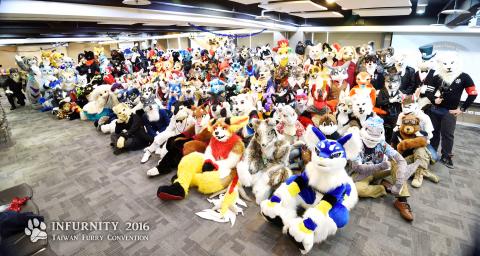
Photo courtesy of Infurnity
This “furry fandom” subculture has only emerged in Taiwan in the past few years. Last month, almost 100 wolves, lions, bears, rabbits and mythical animals attended the second annual “Infurnity” convention organized by Chang, Lan and Gary Pai. The country’s first furry trade show, Furrymosa, is scheduled for May.
BECOMING A FURRY
Even though the phenomenon is relatively new, Lan says he’s had an affinity for anthropomorphic animals since he was a child.
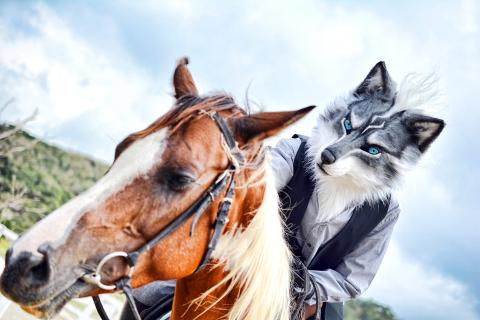
Photo courtesy of Zilven Chang
“I’ve always been a furry,” he says. “I watched animal programs and cartoons. I thought they were so cool. I liked their style. It’s just like how some people like cars and watching sports. It’s a natural instinct — I can’t really explain it.”
Lan was described as cat-like in school, and from this trait he developed his fursona as a majestic yellow feline.
Pai’s fascination began with the mascots he saw when he visited Disneyland as a child.
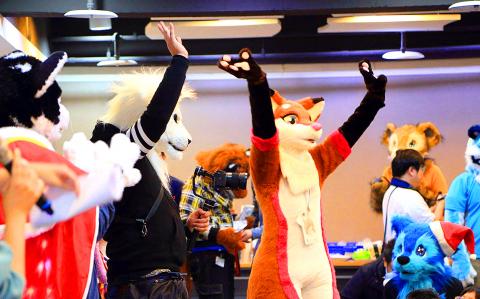
Photo courtesy of J.C. Lan
“I thought they were adorable and approachable, and I liked how they brought people joy,” he says.
As a result, his fursuits lean toward the cartoonish, cutesy type and he adjusts his personality as such. Like Chang, he believes that he’s not acting.
“It’s just how I would act if I became an adorable animal,” he says. “I don’t even think about it.”
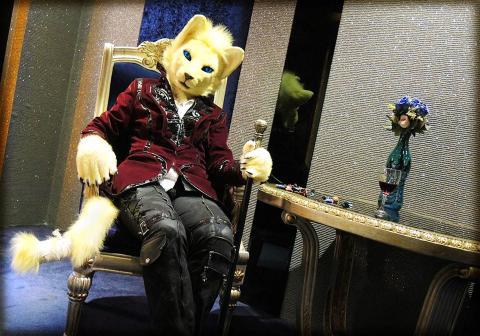
Photo courtesy of infurnity
You can have as many fursonas as you want, but the fursuits are expensive — a decent one can cost up to NT$300,000 Lan says.
There are no set rules, and unlike cosplay, there are no existing characters to model after. Some have the ability to talk, while others only communicate through gestures. Lan says his fursona was originally mute, but as an organizer he found it necessary to start speaking.
Some see their fursonas as extensions or alternate versions of themselves, while others create a separate entity with its own name and backstory. Sometimes people show up at gatherings with just a tail or ears, and that’s okay too.
IN THE REAL WORLD
Chang and Lan exclusively interact with the furry community as their fursonas, and reveal their human identities to only a select few (hence the omission of their Chinese names). Some clues to their furry identity can be found while in human form, as both like to wear shirts with wolves printed on them and have furry accessories on their bags.
Outside of furry gatherings, they only wear their fursuits in public during photo shoots, often scaring the children around them because of how realistic they look.
“I heard one mother say, ‘Don’t be afraid, there’s a person inside,’” Lan says. “That actually upset me because I wanted to be a cat at that moment.”
The ones with cartoonish suits are often received warmly, and some enjoy walking around and taking photos with people. But as furry fandom is still obscure in Taiwan, most people don’t know the true connotation behind the suits.
“People just see our exterior and assume that we’re advertising something as a mascot or shooting a film,” Lan says. “But this is something that goes to the core of who we are.”

Seven hundred job applications. One interview. Marco Mascaro arrived in Taiwan last year with a PhD in engineering physics and years of experience at a European research center. He thought his Gold Card would guarantee him a foothold in Taiwan’s job market. “It’s marketed as if Taiwan really needs you,” the 33-year-old Italian says. “The reality is that companies here don’t really need us.” The Employment Gold Card was designed to fix Taiwan’s labor shortage by offering foreign professionals a combined resident visa and open work permit valid for three years. But for many, like Mascaro, the welcome mat ends at the door. A
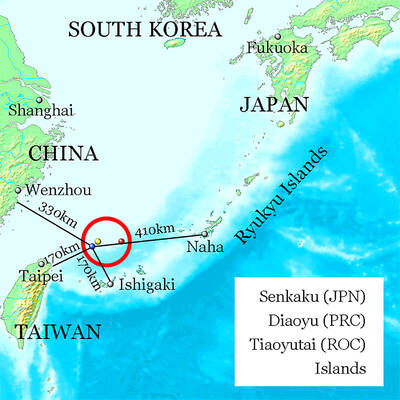
Last week gave us the droll little comedy of People’s Republic of China’s (PRC) consul general in Osaka posting a threat on X in response to Japanese Prime Minister Sanae Takaichi saying to the Diet that a Chinese attack on Taiwan may be an “existential threat” to Japan. That would allow Japanese Self Defence Forces to respond militarily. The PRC representative then said that if a “filthy neck sticks itself in uninvited, we will cut it off without a moment’s hesitation. Are you prepared for that?” This was widely, and probably deliberately, construed as a threat to behead Takaichi, though it

If China attacks, will Taiwanese be willing to fight? Analysts of certain types obsess over questions like this, especially military analysts and those with an ax to grind as to whether Taiwan is worth defending, or should be cut loose to appease Beijing. Fellow columnist Michael Turton in “Notes from Central Taiwan: Willing to fight for the homeland” (Nov. 6, page 12) provides a superb analysis of this topic, how it is used and manipulated to political ends and what the underlying data shows. The problem is that most analysis is centered around polling data, which as Turton observes, “many of these
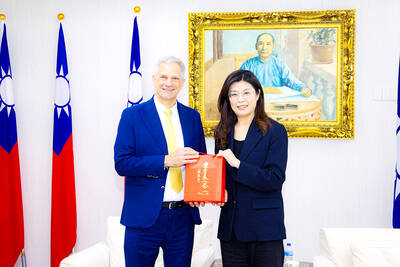
Since Cheng Li-wun (鄭麗文) was elected Chinese Nationalist Party (KMT) chair on Oct. 18, she has become a polarizing figure. Her supporters see her as a firebrand critic of the ruling Democratic Progressive Party (DPP), while others, including some in her own party, have charged that she is Chinese President Xi Jinping’s (習近平) preferred candidate and that her election was possibly supported by the Chinese Communist Party’s (CPP) unit for political warfare and international influence, the “united front.” Indeed, Xi quickly congratulated Cheng upon her election. The 55-year-old former lawmaker and ex-talk show host, who was sworn in on Nov.